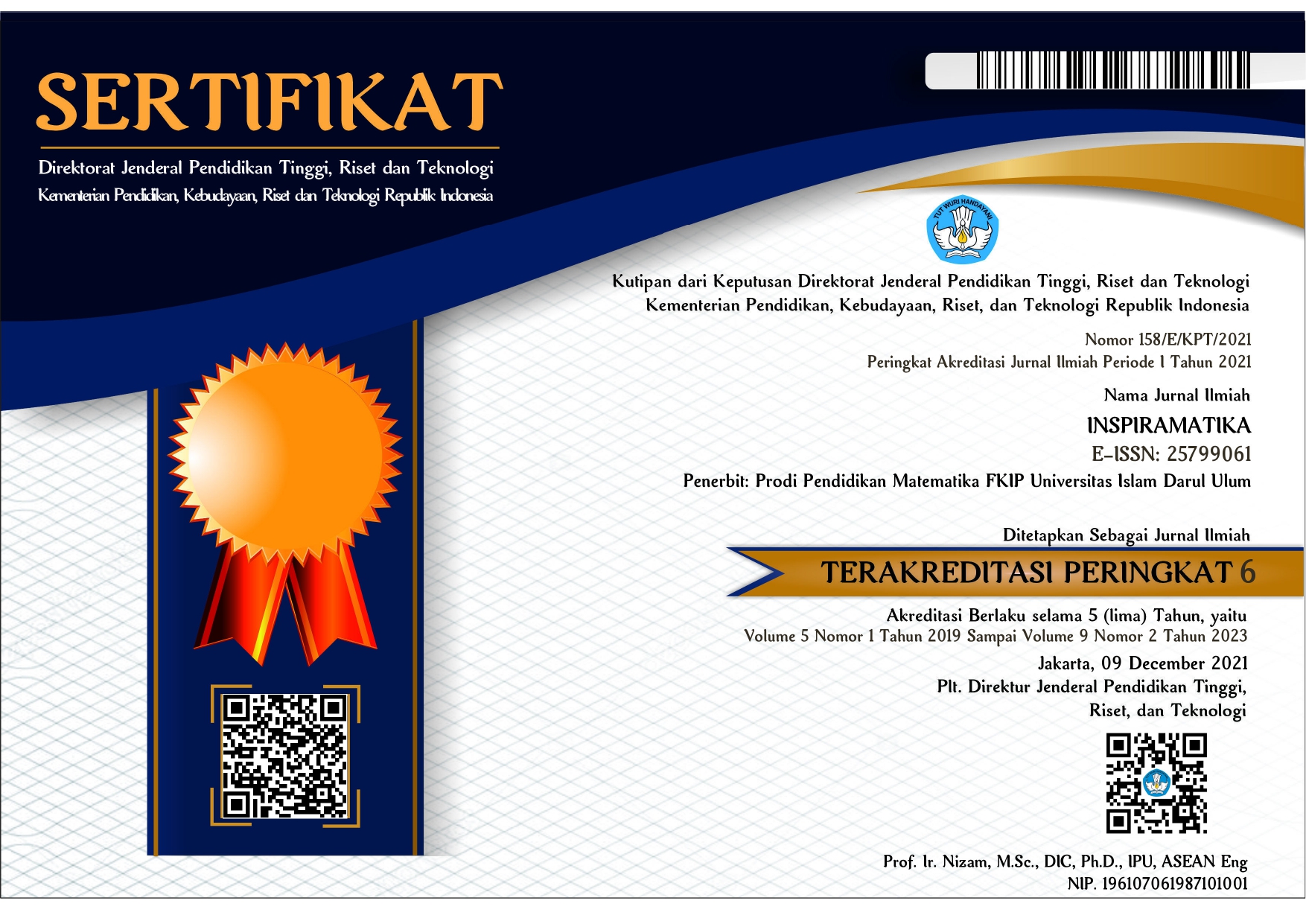PENGARUH MODEL PEMBELAJARAN STEM TERHADAP PEMAHAMAN KONSEP MATEMATIKA SISWA KELAS VIII SMP NEGERI 1 TINAMBUNG
Abstract
The purpose of this study was to determine whether the understanding of mathematical concepts in class VIII students of SMP Negeri 1 Tinambung who were taught using the STEM learning model was higher than the understanding of mathematical concepts in class VIII students of SMP Negeri 1 Tinambung who were taught using the direct learning model. This type of research is a quasi-experimental with a nonequivalent control group design which was carried out at SMP Negeri 1 Tinambung for the 2022/2023 academic year. The sampling technique used was cluster random sampling with class VIII A as the experimental class and class VIII B as the control class. Data collection techniques include tests, observations and questionnaires. While the data analysis techniques used descriptive analysis and inferential analysis. Based on the results of descriptive analysis it can be concluded that students' understanding of mathematical concepts taught using the STEM learning model is included in the good category, students' understanding of mathematical concepts taught using the direct learning model is included in the sufficient category. Then, the result of inferential analysis, show that students' understanding of mathematical concepts taught using the STEM learning model higher than the understanding of students' mathematical concepts taught using direct learning models.
Downloads
References
Handayani, S., W, S. U. M., Rachmawati, D., & Wahyono, H. (2020). Evaluasi Pembelajaran berbasis STEM Mata Pelajaran Ekonomi. Malang: PT Literindo Berkah Jaya.
Kemdikbud. (2019). Hasil PISA Indonesia 2018: Akses Makin Meluas, Saatnya Tingkatkan Kualitas. Diakses dari: https://www.kemdikbud.go.id/main/blog/2019/12/hasil-pisa-indonesia-2018-akses-makin-meluas-saatnya-tingkatkan-kualitas. [26 Oktober 2023].
Khairiyah, N. (2019). Pendekatan Science, Technology, Engineering dan Mathematics (STEM). (Edisi I). Medan: Spasi Media.
Mayasari, T., Kadorahman, A., & Rusdiana, D. (2014). Pengaruh Pembelajaran Terintegrasi Science, Technology, Engineering, and Mathemathics (STEM) pada Hasil Belajar Peserta Didik: Studi Meta Analisis,. Prosiding Semnas Pensa VI: Peran Literasi Sains, 371–377.
Meinarni, W. (2022). Implementasi Model Pembelajaran STEM Dalam Pembelajaran Matematika di SD. JEMARI: Jurnal Edukasi Madrasah Ibtidaiyah, 4(2), 109–114. https://doi.org/10.30599/jemari.v4i2.1725
Meltzer, D. E. (2002). The relationship between mathematics preparation and conceptual learning gains in physics: A possible “hidden variable” in diagnostic pretest scores. American Journal of Physics, 70(12), 1259–1268. https://doi.org/10.1119/1.1514215
Permendikbud No. 58 Tahun 2014 Tentang Kurikulum 2013 SMP/MTs.
Nasution, M. K., Irmayanti, I., & Julyanti, E. (2018). Efektivitas model pembelajaran direct instruction (DI) terhadap kemampuan pemahaman konsep matematika siswa pada materi pecahan kelas VII SMP Muhammadiyah-25 Rantauprapat. JPMS: Jurnal Pembelajaran dan Matematika Sigma, 4(2), 27–33.
Nursyahidah, F., & Mulyaningrum, E. R. (2022). The Impacts of Stem on Mathematics and Science Through Lesson Study: a Systematic Literature Review. Kalamatika: Jurnal Pendidikan Matematika, 7(2), 125–142. https://doi.org/10.22236/kalamatika.vol7no2.2022pp125-142
Riyanto, Fauzi, R., Syah, I. M., & Muslim, U. B. (2021). Model STEM (Science, Technology, Engineering and Mathematics) dalam Pendidikan. Bandung: Widina Bhakti Persada.
Sirait, E. D. (2017). Pengaruh Gaya dan Kesiapan Belajar Terhadap Pemahaman Konsep Matematika Siswa. Jurnal Formatif, 7(3), 207–218.
Stracke, C. M., Dijk, G. van, Daneniene, J., Kelmelyte, V., Lisdat, F., Wesolowski, A., Barreiros, A., Baltazar, R., Simoens, W., Desutter, J., Pascoal, A., Rimkevičė, A., Spatafora, M., Cotovanu, A. M., & Spatafora, A. (2019). The Pedagogical Model for Innovative STEM Learning and Teaching. 1–67. https://doi.org/http://www.doi.org/10.5281/zenodo.3899929
Suprihatiningrum, J. (2014). Strategi Pembelajaran: Teori dan Aplikasi. Yogyakarta: Ar-Ruzz Media.
Syukri, M., & Halim, L. (2013). Pendidikan STEM dalam Entrepreneurial Science Thinking “escit”: Satu Perkongsian Pengalaman dari UKM untuk Aceh. Aceh Development International Conference. Maret 2013. https://www.researchgate.net/publication/235993770
Ulum, M. (2021). Peningkatan Kemampuan Memahami Persamaan Kuadrat dengan Metode Kerja Kelompok. Jurnal THEOREMS: The Original Research of Mathematics, 5(2), 93–102.

This work is licensed under a Creative Commons Attribution-ShareAlike 4.0 International License.







.png)




